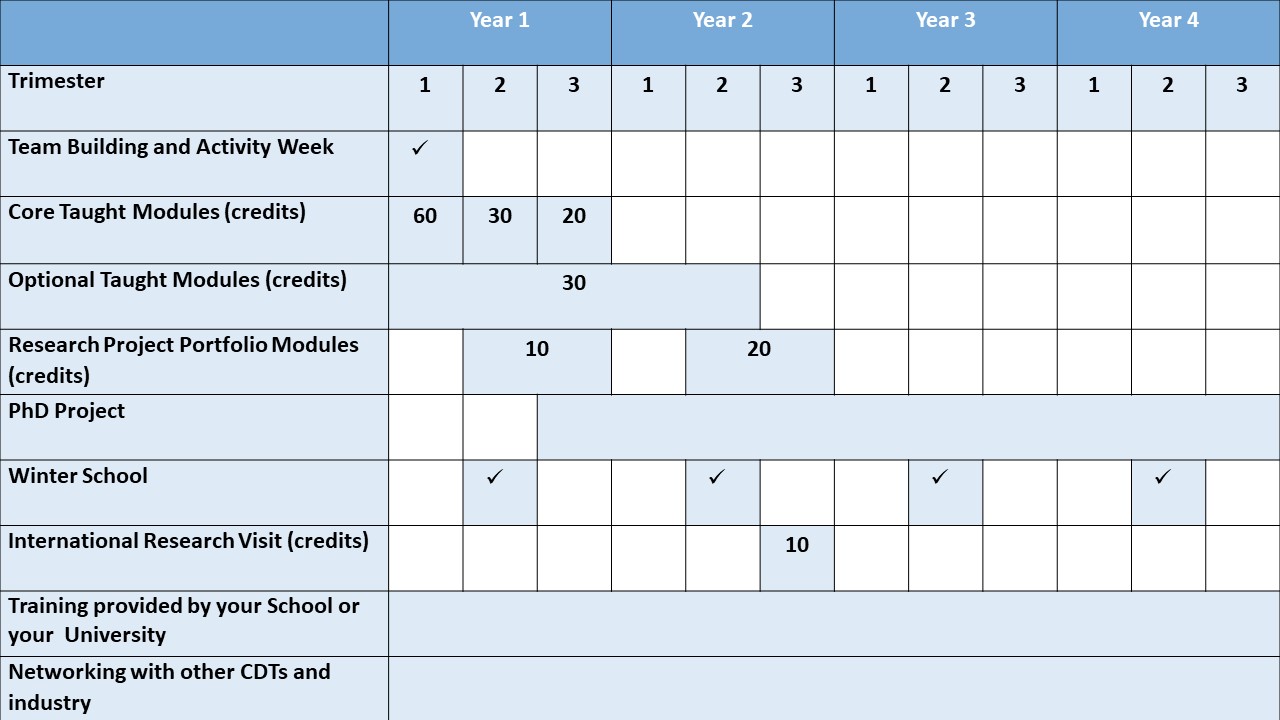Experience with our predecessor CDTs has shown that the combined
training and research programme produces doctoral graduates who are highly
employable in multiple roles in industry, government as well as academia. Throughout the programme you will be using and building your existing skillset and work together with our students,
academics across three institutions and industry to build your network for the
future.
During the first two years
of your training, you will be completing a series of modules together with your
cohort. You will learn together and from each other as you will have different
academic backgrounds. The training will enable you to gain knowledge on the
energy sector as well as forming friendships and professional relationship for
your further employment.
We will host annual
Residential Schools during which you will network with leading scientists and
leaders from academia, government and industry as well as strengthening your
teamworking and presentation skills.
Support is available for
students with disability and the student-led CDT EDI working group actively
advises the management on accessibility of all our activities.
See below our training calendar. There will be some flexibility to account for personal requirements.

Recognise and appraise developments and applications for current and emerging technologies for power generation and CCUS.
(10 credits)
Understand, assess, and communicate the wider societal, cultural, political, and global contexts of energy technologies. Critically discuss ethical questions arising from energy generation and realted policies.
(20 credits)
Recognise how the behaviour of individuals and teams impact projects. Learn appropriate leadership styles and motivational tools. Develop and assess the critical components of a business plan. Interpret technical patents and understand IP protection.
(10 credits)
Learn more about your sponsoring company or industrial stakeholders and contextualise their research. Recognise and reflect on the importance of research to industry.
(10 credits)
Appraise and reflect on the processes involved for the successful completion of research projects. Identify your own professional development opportunities and develop your research skills.
(10 credits)
Gain a comprehensive critical appreciation of the physical principles, technologies, processes, and underlying technical and economic issues surrounding the low-carbon manufacturing of fuel and chemical feedstocks. Explore technology options and pathway scenarios to ensure low-carbon, yet competitive process industry by 2050.
(10 credits)
Become aware of the importance of communicating your research to a wide audience. Learn to communicate your research effectively to people from different backgrounds.
(10 credits)
Complete a project plan and literature review.
(10 credits)
Study the methods used to identify, record, quantify and eliminate/mitigate different types of risk. Apply risk mitigation procedures in different scenarios.
(10 credits)
Through this hands-on training, you will appreciate and adhere to industrial health and safety practices. Design, conduct and analyse industrial experiments using large-scale machinery.
(20 credits)
You will be expected to present your work at at least one major international conference, where you can establish links with your peers around the world. There is also the opportunity, where appropriate, to work overseas for a period at a research facility or company relevant to your project.
(10 credits)
Report research results to date. This encourages early publication (subject to IP) through the presentation of a paper.
(20 credits)